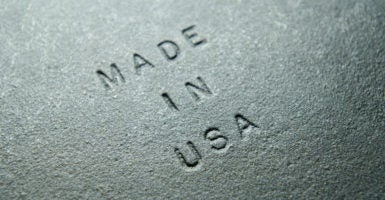Buried deep in the text of the 728-page water bill being considered in Congress is a costly provision that requires the use of American-made iron and steel for water infrastructure projects. That provision will hit the taxpayers with extra and unnecessary costs.
The Water Infrastructure Improvements for the Nation (WIIN) Act expands the federal government’s role in funding local water infrastructure, including for the current project in Flint, Michigan to replace more than 10,000 pipes that were found to be contaminated.
The estimated cost of this project may reach $7,500 per line, and that could only increase under this legislation if contractors are required to use only American-made pipe.
“Buy America” provisions sound great—they are pitched by politicians as a way to support U.S. industry. But this often means that a government agency may have to pay more for a product or service that it could get at a more competitive cost elsewhere.
Under the WIIN Act, the Buy America provision cannot be waived unless the cost of buying U.S. products raises the overall cost of a project by more than 25 percent, or if the product simply isn’t available from U.S. manufacturers
When it comes to Flint, this provision could be extremely costly. If the WIIN Act ends up providing funding for Flint, what ought to be roughly a $75 million project could cost American taxpayers just shy of $94 million.
This is just one example of how the Buy America provision of the WIIN Act would pose unnecessary costs. Many more examples exist around the country that would only multiply the waste.
The effect of such provisions is to transfer resources from ordinary Americans to companies that employ top lobbyists in Washington.
Rather than supporting special interest groups and wasting taxpayer dollars through Buy America provisions, Congress should allow free and open competition in all infrastructure projects.






























